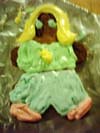If someone had told me that I would be reading a book in which the heroine is an Enlightenment natural philosopher, daughter and brother to witchfinders, witness to the Salem witch trials, a member of an Indian tribe, beloved of a young Ben Franklin, one of two people who knows the coordinates of an island on which escaped slaves debate the merits of government, and the personified end to witch hunting, I would have cocked an eyebrow. If that someone had then breathlessly explained that the book was in fact written by another book, Isaac Newton’s Principia Mathematica, I would have given that person the finger for wasting my time with such nonsense.
And yet, here it is: The Last Witchfinder by James Morrow. And it’s amazing.
Ordinarily, I wouldn’t be able to stomach a book that tries to shove everything mentioned above into one book, let alone one character. It smacks of a high schooler trying to combine as many awesome 17th—18th century events into a single story, fashioning a Mary Sue to triumph over each trial, and then uploading it to fanfiction.net. It would be too, if the Principia Mathematica hadn’t been telling the story.
James Morrow gives the Principia perhaps the most understandable voice of the whole novel, both in word and in concept. While the characters speak in a quick, Enlightenment-era patter, the Principia has had the benefit of surviving to the modern day, picking up the up to date slang and a wry sense of humor. While the non-physicist reader stares dumbly as Jennet, our heroine, and Ben Franklin debate Newtonian theories, the very being that embodies these theories molds them into beautiful, non-obtrusive metaphors. It’s the Principia’s very human voice that turns these philosophically-minded characters into relatable beings.
The Last Witchfinder is a book that can span disparate genres of bookworms. Scientifically-minded readers can revel in Reason overcoming superstition and actual Newtonian philosophy; English majors can marvel in the prose that is gorgeous enough to make some of the textbook sections a little less mysterious. It’s a book that I will read over and over—pausing only to pass it along to my engineer mother, who will undoubtedly love it as much as I do.
Thursday, March 25, 2010
Subscribe to:
Post Comments (Atom)








No comments:
Post a Comment